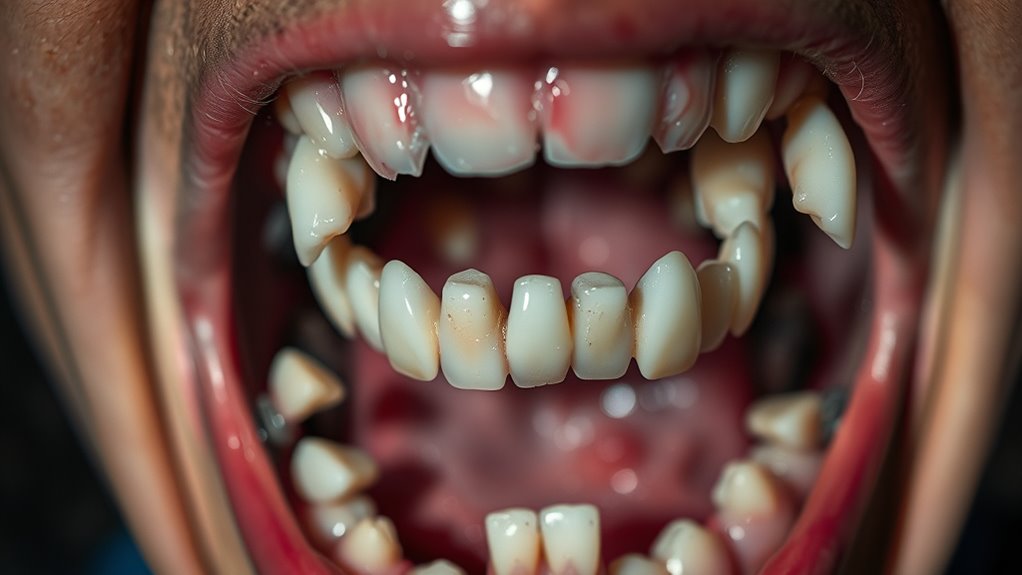Dreams about teeth falling out often symbolize both anxiety and personal transformation. If you’re feeling overwhelmed or insecure, these dreams may reflect fears of losing control, confidence, or your appearance. On the other hand, they can also mirror significant life changes, like growth or new beginnings. Recognizing whether your dreams are linked to stress or change can help you better understand your inner emotional state. Keep exploring to uncover more insights behind these powerful dreams.
Key Takeaways
- Dreams about losing teeth often reflect underlying anxiety, stress, or insecurity related to personal control or self-esteem.
- They can symbolize significant life changes or transitions, representing personal growth and transformation.
- Such dreams serve as subconscious messages signaling emotional vulnerability and the need for self-reflection.
- Repeated episodes may indicate unresolved stress or fears that require addressing for emotional well-being.
- Interpreting these dreams within emotional and contextual cues helps distinguish between anxiety and opportunities for positive change.

Dreams about teeth falling out are surprisingly common and often leave you feeling anxious or unsettled upon waking. These vivid images can stir up feelings of vulnerability, loss, or even embarrassment. While they may seem like just strange nighttime occurrences, they often hold deeper significance, reflecting your current emotional state or life transitions. When you experience these dreams repeatedly, it’s worth exploring what they might reveal about your inner world, especially regarding stress management and personal growth.
Recurring dreams of teeth falling out reveal underlying stress and emotional shifts in your life.
If you’re dealing with high levels of stress, these dreams can be a subconscious signal that you’re overwhelmed or anxious about your daily responsibilities. Teeth are symbols of strength, confidence, and appearance; losing them in dreams could mirror concerns about losing control or feeling insecure. Recognizing this connection can be a crucial step in managing stress effectively. Taking proactive measures such as mindfulness, meditation, or even talking to someone about your worries can help ease the tension that fuels these dreams. Implementing healthy stress management strategies not only reduces the frequency of unsettling dreams but also promotes overall mental well-being.
On a deeper level, teeth-falling-out dreams often mirror personal growth and transformation. You might be going through significant changes—perhaps a new job, a relationship shift, or self-discovery—that challenge your sense of stability. These dreams could symbolize the shedding of old beliefs or habits, making room for new versions of yourself. Instead of viewing them solely as negative, you can interpret these dreams as a sign that you’re on the brink of growth. Embracing change and trusting the process can turn unsettling dreams into opportunities for self-reflection and development.
Additionally, these dreams may encourage you to pay closer attention to your self-esteem and how you handle criticism or change. They push you to confront feelings of vulnerability, prompting personal growth. You might find that by addressing underlying anxieties and working through fears, you can reduce the occurrence of these dreams. Over time, this process can strengthen your resilience and self-awareness.
Furthermore, understanding the role of color accuracy and contrast ratio in visual representations can help you appreciate how your subconscious perceives and processes these symbols, deepening your insight into your emotional state. Ultimately, teeth-falling-out dreams serve as a mirror of your inner emotional landscape. Whether they’re a sign of stress or a symbol of transformation, they invite you to examine your current state and consider what changes or coping strategies could support your growth. By managing stress better and embracing personal development, you can lessen the impact of these dreams and foster a healthier, more confident outlook on life.
Frequently Asked Questions
Can Teeth-Falling-Out Dreams Predict Future Health Issues?
You might wonder if teeth-falling-out dreams can predict future health issues. While dream symbolism analysis suggests these dreams often reflect stress or change, there’s no scientific proof they forecast actual health problems. Instead, they serve as signals to pay attention to your emotional well-being. Focus on understanding the symbolism in your dreams, and address underlying anxieties to maintain overall health, rather than relying on them as predictive tools.
Are These Dreams More Common in Certain Age Groups?
Imagine your dreams as a mirror reflecting your life’s chapter. You might notice teeth-falling-out dreams are more common during certain developmental stages or age-specific patterns, such as adolescence or old age. As you move through different ages, your subconscious copes with change and growth. These dreams can shift in frequency, revealing how your mind processes anxieties or transformations tied to specific age groups.
How Do Cultural Beliefs Influence Interpretations of These Dreams?
You should recognize that cultural beliefs greatly shape how you interpret teeth-falling-out dreams. Cultural symbolism offers diverse meanings, influencing whether you see them as signs of anxiety, transformation, or even luck. Your cultural background guides your interpretative diversity, making these dreams more personal and nuanced. By understanding these cultural influences, you gain deeper insight into your subconscious messages, helping you navigate your emotions and life changes more effectively.
Do Recurring Dreams Indicate Unresolved Emotional Conflicts?
Recurring dreams often point to unresolved emotional conflicts, signaling your subconscious messages. When these dreams keep happening, it’s likely your mind is trying to process lingering issues or stress. You should pay attention to these patterns, as they reveal deeper feelings you might not be fully aware of. Addressing these emotional conflicts can help bring clarity and peace, reducing the frequency of these recurring dreams over time.
Can Dream Analysis Help Reduce Anxiety Related to These Dreams?
You wonder if dream analysis can ease your anxiety about recurring dreams. By exploring dream symbolism, you can uncover hidden meanings and understand what your subconscious communicates. This emotional release helps you process unresolved feelings, reducing anxiety. When you interpret these dreams, you gain insight and clarity, turning fear into understanding. Ultimately, engaging with your dreams offers a pathway to emotional healing, helping you feel more grounded and less anxious about recurring dreams.
Conclusion
So, next time you wake up with a mouthful of lost teeth, just remember—you’re not losing your mind, just your dental dignity in your dreams. Maybe it’s anxiety, or maybe your subconscious is just trying to give your dentist a break. Either way, don’t panic—after all, losing teeth in dreams is the universe’s way of telling you that change is inevitable, or at least that you should probably floss more.










